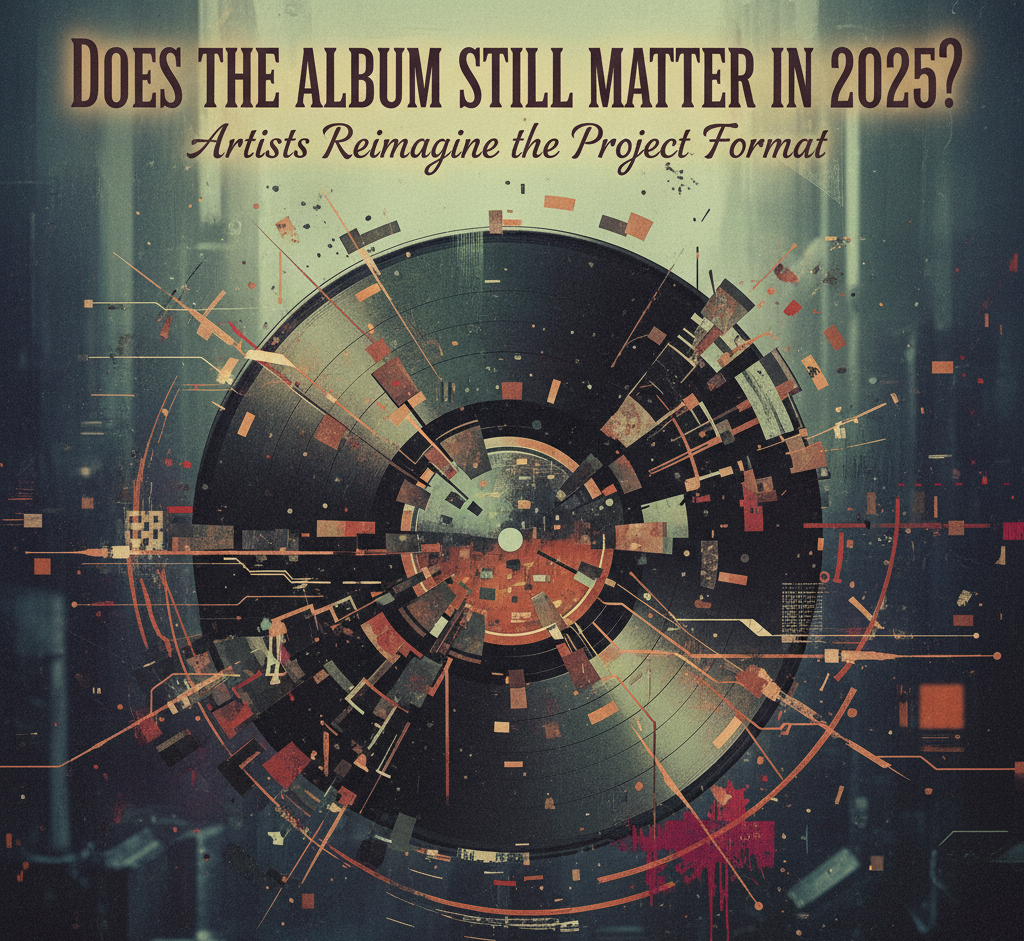It’s 2025, and the way we consume music is unrecognizable from even five years ago. TikTok trends can turn a 12-second loop into a Billboard hit. Streaming playlists have become the new radio. AI tools can generate songs in minutes. In a world that moves this fast, does the album still matter?
The short answer: yes.
But the why behind that yes is evolving faster than ever.
 The Album as a Business Model
The Album as a Business Model
For decades, the album was both a creative and economic anchor. It wasn’t just a collection of songs, it was the core product. Labels built release cycles, tours, and marketing campaigns around it. For many artists, it was a rite of passage: your debut album defined your voice, your sophomore project tested your longevity, and your third cemented your legacy.
But the streaming economy rewrote the rules. According to Luminate’s 2024 Music Report, over 75% of music consumption now comes from individual tracks, not albums. Singles drive visibility, and playlists drive discovery. It’s a numbers game: the more songs you release, the more chances you have to land on algorithmic playlists.
That shift made artists rethink strategy. Why spend a year crafting a 12-track album when one viral single can change your career overnight? The economics seem clear but culture is never purely mathematical.
The Album as a Creative Statement
The truth is, the album was never just about numbers. It was about narrative. It allowed artists to tell a story, build a world, and invite listeners into it. Kendrick Lamar’s To Pimp a Butterfly, Frank Ocean’s Blonde, Beyoncé’s Renaissance, these weren’t just tracklists; they were cultural events.
Even in today’s fragmented music landscape, that depth still matters. As Rolling Stone’s 2024 Future of Music survey found, over 60% of listeners say they’re more emotionally connected to artists who release full-length projects, even if they primarily stream singles.
That emotional connection has real business value. Artists who build worlds visually, conceptually, and sonically develop stronger brands, longer careers, and more loyal fanbases. In an era of short attention spans, storytelling has become the rare commodity that sustains longevity.
The Rise of the “Modular Album”
The modern artist, however, isn’t clinging to tradition, they’re reinventing it. Enter the modular album, a flexible, ever-evolving format that adapts to audience engagement in real time.
Think of it as a living, breathing body of work. An artist releases a few songs, gauges fan response, and then expands the project over time. Travis Scott’s Utopia and SZA’s SOS exemplify this new model, projects that evolved post-release through deluxe editions, updated visuals, and extended narratives.
Some artists even treat streaming platforms like interactive canvases. They swap tracks, remix existing ones, or drop alternate versions weeks after release. It’s part of a new creative economy where the album is no longer static, it’s iterative.
The Business of Belonging
Behind this evolution lies a simple truth: fans no longer just want to consume music, they want to participate in it. According to IFPI’s 2024 Global Music Report, 73% of Gen Z listeners say they follow artists “for the lifestyle and storytelling as much as for the music.”
That’s why many independent artists are using platforms like EngineEars Direct or Bandcamp to sell their projects directly to fans, offering unreleased stems, visual art, handwritten notes, or exclusive access to studio sessions. The album isn’t dying, it’s diversifying.
When artists own their narrative and their distribution, the album becomes more than a listening experience. It becomes a community experience. One that drives engagement, sales, and long-term loyalty.
The Hybrid Future: Projects with Purpose
So where is this all heading? The most forward-thinking artists are blending the immediacy of singles with the depth of albums. They drop conceptual projects in episodic form, release sound-driven series tied to visuals or short films, or bundle songs into “chapters” that evolve seasonally.
The strategy aligns with a simple creative truth: audiences crave connection and context. A great single may grab attention, but a great project builds identity.
As producer and artist Pharrell Williams said in a 2024 interview with Billboard,
“Albums will always matter when they mean something. It’s not about how many songs you drop, it’s about what those songs say together.”
That’s the new benchmark: meaning.
CONCLUSION
The album isn’t obsolete, it’s being reengineered. In 2025, it’s less about format and more about function. Whether released as a 10-track experience, a serialized rollout, or a fan-exclusive drop, what matters most is intentional storytelling.
The artists who win today aren’t just making songs; they’re building worlds. They’re merging art and analytics, emotion and entrepreneurship, data and depth.
And in that balance lies the modern album’s new power: an evolution that keeps music human in an age that feels increasingly automated.
